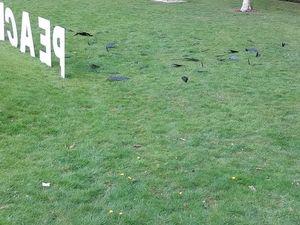Use of Tasers by West Midlands Police nearly doubles inside three years
The number of West Midlands Police officers using Tasers has almost doubled in three years, according to figures released under the Freedom of Information Act.

The force has released figures on withdrawals and discharges of Tasers by officers since 2017/18 – as well the number of times a single officer withdrew or discharged the weapon.
The response to a request from WhatDoTheyKnow site user D.Moore shows 255 officers discharged Tasers in 2019/20 compared to 133 in 2017/18 – while they were fired by 148 officers in 2018/19.
At the same time, 331 officers withdrew the weapons in 2019/20 compared to 162 in 2017/18 and 220 the following year.
In 2017/18 the highest number of time a single officer discharged their Taser was twice, compared to seven times in 2019/20.
The force also stated it holds around 600 of the X26 devices and 1,260 of the X2 devices.
The West Midlands Police and Crime Commissioner, Simon Foster, said: “If an officer is confronted by a violent offender then it’s vital they have the means to protect themselves and the public.
“That said, Taser use does need to be scrutinised closely to ensure it is deployed in a safe, controlled and professional manner and only when lawful, necessary and proportionate.
“My job is to hold West Midlands Police to account and that’s why I have organised for members of the public to meet regularly and analyse police body worn video and Taser data to ensure our officers are using the devices only when lawful, necessary and proportionate.”

Tasers are devices intended to be used to incapacitate a target using a high-voltage electrical discharge. They can potentially lead to cardiac arrest and kill according to 2012 reports.
Growing use of Tasers has been cautioned against by human rights groups.
Oliver Feeley-Sprague, Amnesty International UK’s policing expert and a member of the independent advisory group to the National Police Chiefs’ Council lead on Tasers, said: “The simple truth is that the more Tasers move away from specialist violence prevention tools and become a routine part of policing in the UK, the more chance they will be misused and result in tragedy.
“Tasers are linked to hundreds of deaths in the USA where they’ve been available for longer than over here, but they are also now linked to a growing number in Britain.
“That should serve as a serious warning that need to keep these weapons in the hands of specialist officers, subject to enhanced training, strengthened guidance and better oversight and accountability.
“We’ve always said that as a specialist weapon Tasers can be effective, if used by well-trained officers to prevent loss of life or serious injury – but it can’t be stressed enough that Tasers are potentially lethal, and excruciatingly painful weapons that should remain subject to restricted and limited availability.”
It was reported in December black people in the West Midlands were 4.2 times more likely than white people to have Tasers used against them – including cases where they were drawn but not discharged.
This is set against a national picture where, black people are 7.6 times more likely to have Tasers used against them than white people.
Mr Feeley-Sprague said: “Amnesty has got serious concerns about Tasers being used disproportionately against black people as well as against vulnerable groups such as those with mental illnesses, or children.
“We’ve also got wider worries about their over-use in general.
“We want to see a thorough review into police use of Tasers, including their role in perpetuating institutional racism within policing, with a focus on the need for comprehensive training, better guidelines over their use and on greater transparency and record-keeping over the circumstances in which these powerful weapons are being deployed on our streets.”





